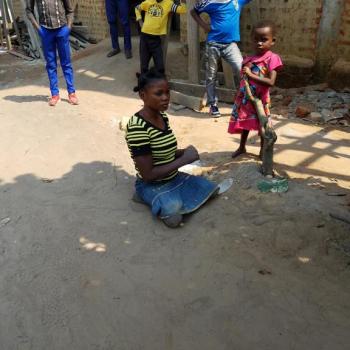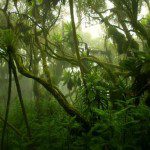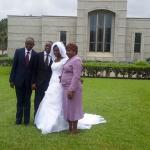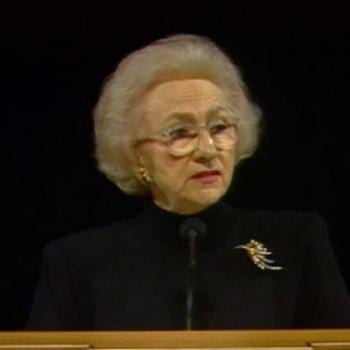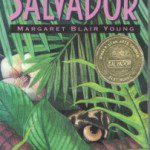 …[B]ut the Lord was not in the wind: and after the wind an earthquake; but the Lord was not in the earthquake: And after the earthquake a fire; but the Lord was not in the fire: and after the fire a still small voice. (1 Kings 19:11-13 (KJV)
…[B]ut the Lord was not in the wind: and after the wind an earthquake; but the Lord was not in the earthquake: And after the earthquake a fire; but the Lord was not in the fire: and after the fire a still small voice. (1 Kings 19:11-13 (KJV)
I am struck by how much I DON’T remember about Chulac and the miracles I saw there. As I have spoken with others to help me remember without my own filters, I have thought about Joseph Smith’s various accounts of the First Vision. My actual memory features only two incidents: 1) the young woman in Chulac asking for a blessing, and 2) the experience in the Catholic Church after Mass. As I’ve tried to reconstruct the whole experience, I have had to be reminded of who else was present. I knew that Dale was there, but because I also know now how his particular story veered away from the trajectory I had expected, my memory has largely edited him out. Yet his presence was vitally important. In my memory, I am a passenger in a jeep headed a long, long way up an untamed path from Coban to Chulac. People remove or cut branches to provide a path for the jeep. I do not remember the driver. As others have helped me recall, I have to modify as follows: It was a large truck, not a jeep. Missionaries (Elder JB and his companion) were in the truck bed. Dale drove. Not only was my dad with me, but two other men, Dean Black and Gustavo Ramirez. Without reminders and others’ memories, I could well have remembered only that Dad and I and Elder JB were there.
Dale drove us to Chulac in this truck. We stopped every now and again to remove unyielding branches and then lurched forward again. At last, after hours of driving, there it was–a sprawling Shangrila in the jungle. Thanks to others, I even have the date we arrived in Chulac. It was August 21st, 1976. Dale had brought a surprise for the folks of Chulac–a movie. He would provide them their first cinematic experience.
Though the movie was a huge success, I have to be reminded of it. For any of the natives in Chulac, it was perhaps a peak experience–their first time seeing a film. It was about an escape from a Nazi prison camp. Elder JB translated.
Chulac’s inhabitants spoke no Spanish, only a dialect called K’ekchi. The whole village was untamed splendor–every shade of green in the foliage, and all hues of blue and red in flower petals, whether real or embroidered on the women’s huipiles. Throughout Chulac were hundreds of coffee plants–large, woody bushes with rust-colored berries and waxy leaves. (Germans had once used it as a coffee plantation.) I remember the scent of grapefruit, for there were whole groves of grapefruit trees with many fallen fruits on the ground. When Dad asked a native why there was so much grapefruit on the ground, the answer was, “Maybe the bad ones fall.”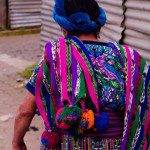
I remember gazing at a flock of parakeets flying freely overhead. I had never seen uncaged parakeets.
At the time, I was thrilled by everything Dale was doing, and the film was certainly a crowd pleaser. I examine my own ways of thinking, and cannot help but recognize something of Dale’s spectacular style in myself. In fact, I have planned for some time to get a cinema into the Democratic Republic of Congo. (Kinshasa, the capital, which has 14,000,000 people, has no cinema.) There are some similarities between the tiny village of Chulac, Guatemala, and the populous Kinshasa, DR-Congo. I have even told some of my adopted missionary sons who served in the Congo that I imagined a 3D Jurassic World presentation in Kinshasa, and wouldn’t that be magnificent? Of course, I would also use the cinema as a university during the day, streaming lectures from scholars throughout the world. When I dream, I dream big. So did Dale. And I suspect that my father could have become not only a supporter of Dale’s work and chairman of the board (as he was), but something like Dale himself, had my mother encouraged him. She did not, however. And so, when I remember watching the movie in a village which had never had anything like it, I also remind myself that the work of God is usually quiet and it is never tainted by self congratulation. When my daydreams feature me in any heroic role, I remind myself to step back and remember that in God’s work, we are all servants.
The most important parts of the Chulac visit happened the following day, Sunday, August 22, 1976.
We were invited to a K’ekchi home for breakfast the morning after our arrival, breakfast being standard fare: thick corn tortillas and black beans flavored with garlic and onion. While we were eating, a K’ekchi woman entered. She looked about fifteen, and addressed herself to Elder J.B. He translated for us.
“She wants a blessing.”
“A blessing?” said Dad. “How did she know we can give her a blessing?”
Elder J.B. spoke to her, and then to us.
“She says when she saw us, she knew we could bless her.”
“Is she sick?” Dad asked.
Again, a K’ekchi conversation, and then an English explanation.
“She says she’s not sick in her body, but in her spirit.”
I don’t remember who anointed, though I know that Elder JB sealed the blessing. Dad, Dale, Dean, and Elder JB laid their hands on her head. (My actual memory shows only Dad and Elder JB, though I am aware that others were present.) I wondered how she had sensed that these foreign men had the power to bless her “sick spirit.” I also remember the reverence which came around me–something like what I had experienced in the Cujcuj hut the previous year in Patsun.
Later, we walked to the Catholic church (a green-towered building, nothing like a cathedral) and waited respectfully for Mass to be performed. Afterwards, the catechist blew out the candles and made an announcement which Elder JB translated for us:
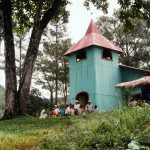
“The Catholic Church has brought us many good things. The Catholic Church has taught us many good lessons. But there is more. God has sent us messengers to tell us more.”
Thus introduced, Elder JB stood and began speaking K’ekchi. He was tall, slim, blonde, and had a mild voice. He held his scriptures in one hand and made small gestures with the other. There was nothing dramatic in his speech, no crescendos or theatrical pauses, simply reverent words about God. Dad whispered to me, “He’s doing exactly what Ammon did. He’s preaching the gospel from beginning to end.”
Elder J B asked how many in the congregation desired to covenant with the Lord to do all things He commanded. All hands went up. Mine was halting, until Dad told me what was being asked.
We all sang “I Am a Child of God” in K’ekchi, which Elder JB had translated for us. I knew the orthography my dad used and was able to pronounce the sounds with no trouble.
After the meeting, the catechist said that we should not use the Catholic Church for LDS meetings, but that there was good ground for a new chapel. He showed us where the Mormon Church would be. It is there now.
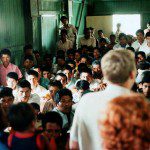
My memories are quiet, and far more drawn to the still moments of the time in Chulac than to the spectacular. I find it interesting that I remember the film which Dale showed as a western, not an escape from Nazis. There is some significance in how my memory has shifted the film’s subject. Cowboys and Indians?
Elder JB would finish his mission a year later, but then would return to Guatemala with Dad and other RMs, along with Dad’s protegee, John Robertson, two beautiful Mexican women, and me in 1978. The rest of the group would stay with Dale, but I would go from there to Momostenango and live with the Zarate family, where I had stayed in 1976.
I recall arriving at Dale’s sprawling plantation before moving on to Momostenango. The center house included a kitchen and large eating quarters. I recall Dale telling Dad and me how awful the LDS area authority–Elder William Bradford–was, and what a fool he had made of himself when he had come to the plantation and told the people that Dale’s projects were NOT the Church. Dad and I shook our heads in sympathy as Dale berated the Church leaders for knowing so little about Guatemala, for not appreciating Dale and his magnificent work, and for being completely unprepared do anything right in the country. Ignoring Dale was like ignoring Jesus. Dad and I were completely in agreement. Dad said something like, “Isn’t that a shame.” I had developed an appallingly good ability to be sarcastic, which I have tried to overcome for forty years now. I don’t remember what I said, but I do remember that I noticed JB’s glance when I said it. He was pacing in front of the door, deep in thought.
Later, when we learned what was actually happening at the plantation, I somehow communicated my change of perspective to JB, who said, “So you’ve figured it out. I didn’t know how much I should say.” (I am certain I don’t recall the exact words, only the gist.)
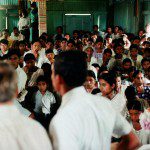
I know that Dale retains his own narrative. My father’s name does not appear in any of Dale’s reports after 1978. Dad has been edited out. I know that JB remembers many details which I do not. Trips to Chulac became frequent parts of his mission, and my descriptions (since I went there only once) are nowhere near as clear as are his. Dad and I remembered the catechist blowing out the candles before introducing Elder JB. We spoke of it several times. In retrospect, I remember Dale’s words condemning Elder Bradford very well, because I would meet with Elder Bradford shortly after leaving Dale’s plantation in 1978, and I would tell him everything we had discovered.
To be continued. . .



